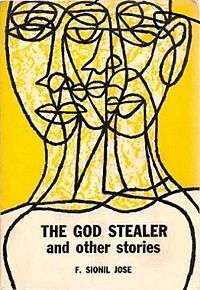The God Stealer
"The God Stealer" is a short story by Filipino National Artist F. Sionil José. It is José's most anthologized work of fiction.[1] It is not just a tale about an Ifugao stealing a religious idol,[2] but also about the friendship that developed between a Filipino and an American, a representation of the relationship that developed between the "colonized" and the "colonizer".[1] The story was a first prize winner during the 1959 Palanca awards in the Philippines.[3] It is included in the book by José with a similar title, The God Stealer and Other Stories.[1]
| "The God Stealer" | |
|---|---|
 Collection first edition | |
| Author | F. Sionil José |
| Country | Philippines |
| Language | English |
| Publisher | Solidarid Publishing House, Inc. |
| Publication date | 1959 (short story) 1968 (collection) |
Character description
The main characters in "The God Stealer" are Philip Latak and Sam Cristie. Philip, also known as Ip-pig, is an Ifugao who became a Christian and lived in Manila. By becoming a city dweller, Philip became less sentimental with his cultural identity, beliefs, and customs. His name was derived from the word Philippines. On the other hand, Sam Christie was an American who wanted to view the rice terraces of the Mountain Province (also known as the Cordilleras). He was also interested in purchasing an original figurine of an Ifugao god. His name was derived from Uncle Sam, a representation of the United States. Philip and Sam were co-workers.[4].[4]
Summary
Philip and Sam went to Baguio City. During a feast honoring Philip for his return, Philip and Sam were because of the unwillingness of the Ifugao people to sell any Ifugao statue. Philip plans to steal his grandfather's god in return for the salary raise given to him by Americans
Interpretation
Philip's act of thievery represented the Filipinos' giving up of their past tribal origins and traditions, only to be replaced by an "unnatural" culture brought by colonialism. At one time in history, colonialism brought to the Filipinos a state of confusion, troubled emotions, helplessness, torment, embarrassment and the inability to embrace the past.[4]
See also
References
- The God Stealer and Other Stories, worldcat.org
- José, F. Sionil. "The God Stealer", The Writers in the South Speak Out, Hindsight, Arts and Culture, The Philippine Star, December 22, 2008, philstar.com
- "The God Stealer", Biography of Francisco Sionil José, rmaf.org
- The God Stealer: Filipino Identity in Fiction By F. Sionil José, filipinowriter.com
External links
- Roces, Mina. "The God Stealer" at Filipino Identity in Fiction, 1945–1972, Modern Asian Studies 28, 2 (1994), pp. 279–315, jstor.org
